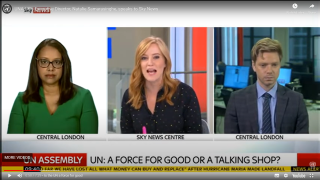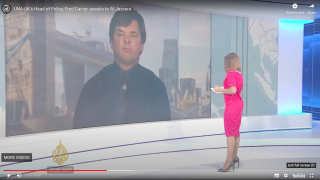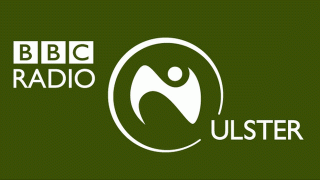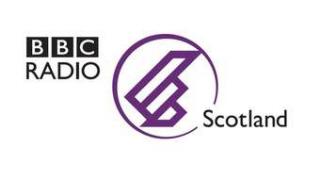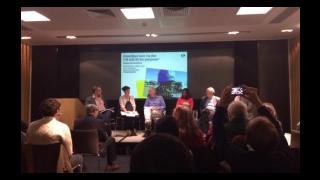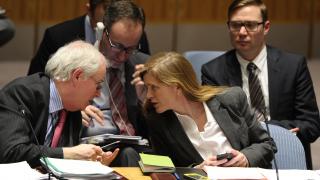
The UN Security Council met to discuss the situation in Ukraine for the fourth time in the space of a week. Ambassadors heard from Deputy Secretary-General Jan Eliasson, who addressed the Council from Kiev. He described Ukraine as "a country on edge" and called for an end to "provocative rhetoric", stressing the UN's readiness to facilitate dialogue.
Eliasson has been in the country since Monday, having been dispatched by Secretary-General Ban Ki-moon to de-escalate the situation and assess conditions for a peaceful settlement. He has been joined by Ivan Simonovic, Assistant Secretary-General for Human Rights, and Robert Serry, Ban's Special Advisor, who was forced to cut short a visit to Crimea after being threatened by unidentified armed men.
Yesterday's closed-door session at the Council reportedly covered Serry's mission and developments on the ground, as well as US and EU sanctions against Russia, which its UN Ambassador, Vitaly Churkin, described as a "double-edged sword". The Ukrainian Ambassador meanwhile repeated his call for urgent action.
As the crisis has progressed, the Council has faced criticism of Cold War-era "deadlock" and questions on whether it can take any action in situations like these. After yesterday's meeting, both UK Ambassador Mark Lyall Grant and US Ambassador Samantha Power agreed that the Council is unlikely to pass any resolutions on Ukraine.
However, Power also stressed the value of Council meetings. She said "the word 'deadlock' suggests a kind of even, 8-7, deadlock among Council members, and that’s not at all the nature of the discussions" and that there was "utility in coming together in order to highlight, particularly in these public meetings, the extent of Russia’s isolation." In rare split from Russia, China declared its "respect [for] the choice made by the Ukrainian people" in the Council last month, a position most likely rooted in its antipathy to any violation of state sovereignty.
UNA-UK's Chairman, Sir Jeremy Greenstock, has given a number of press interviews on the situation, calling for dialogue and restraint. On 3 March, he told Sky News and BBC 5Live: "We need to back off, de-escalate, talk and see how we can help Ukraine reach a proper state with all minorities, including Russian citizens."
This morning, he was interviewed on BBC World Service on the effectiveness of sanctions against Russia. He noted that sometimes leaders reach for sanctions because they don't want to appear to their domestic audiences as though they are doing nothing but talking and "there is an element of that in the American approach". That said, he believed the announcements have sent a strong signal of disapproval for actions that are clearly against international law. While they are not likely to change the Russian President's attitude in the short term, they could have impact if they begin to seriously affect the country's trade, especially oil and gas exports.
He stressed, however, that the US and EU needed to work with Russia on a number of issues. Consequently, they "need to take a certain amount of stick from the Russians in trying to bring them back into an international partnership for global peace and global trade".
Photo: Mark Lyall Grant (left), UK Permanent Representative to the UN, confers with US Permanent Representative Samantha Power during the Security Council meeting on the situation in Ukraine on 3 March 2014 (c) UN Photo/Evan Schneider

